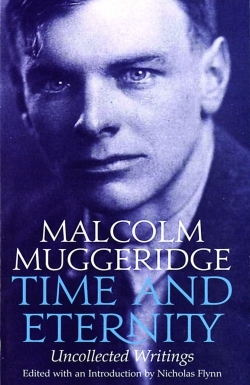Time and Eternity
The Uncollected Writings of Malcolm Muggeridge
Malcolm Muggeridge (1903-1990) was the controversial British journalist who reported on the famine in the Ukraine and on the brutality of Stalinism; a man of letters; a television/radio personality; a Christian; and a vocal supporter of Mother Teresa. In this latest collection, edited by London-based writer and friend Nicholas Flynn, Muggeridge emerges as a candid, level-headed writer whose essays reflect an urgency toward independent thinking. Often skeptical of official narratives on current events and of celebrities, he remained unafraid to contradict them.
Flynn has arranged two dozen essays according to chronology and theme, beginning with an argument against collectivization and concluding with the titular “Time and Eternity.” The result is a curious survey of a life lived with increasing conviction in people’s capacity for misguidance, from choices in leadership to entrapment in temporality. Muggeridge, however, was no misanthrope. Though his writings often expose social ills, they are pervaded by an assurance that speaking out can effect change.
Whether exploring eternal questions, considering the Nazis, revisiting Virginia Woolf, or musing on the disingenuous nature of the camera, Muggeridge alternately charms and challenges his readers with a leveling wit that could describe a “ghastly weekend” in New York with a couple who later moved to “a remote suburb with a car and a flavour of death” just as easily as the “Bloomsbury set, now decidedly in fashion,” or more unsparingly, the “two gimcrack prophets,” Bertrand Russell and D.H. Lawrence. Reflections on historic events as well as prominent literary figures would especially appeal to readers intrigued by twentieth-century subjects, though to read Muggeridge solely with the intention of drawing modern parallels would not do him justice.
The more notable selections in this book are his writings on Christianity. Colorful, chiding, and uncannily prescient–if perhaps less widely known than those penned by his contemporary, C.S. Lewis–they reveal a depth of observation when it comes to human tendencies to diminish the quality of worship (“The Gospel of Jesus Egalité”), to confuse quality of life with sanctity of life (“On the Side of Life”), and to pollute the meaning of words (“In the Beginning was the Word”). Muggeridge presents his views without compromising his position, even while maintaining an appealing, everyman geniality. It was his own wish that “words themselves… however transient their impact on other minds” would persist. Flynn’s gathering serves as a fitting tribute and rediscovery.
Reviewed by
Karen Rigby
Disclosure: This article is not an endorsement, but a review. The publisher of this book provided free copies of the book to have their book reviewed by a professional reviewer. No fee was paid by the publisher for this review. Foreword Reviews only recommends books that we love. Foreword Magazine, Inc. is disclosing this in accordance with the Federal Trade Commission’s 16 CFR, Part 255.

